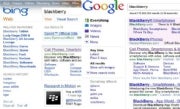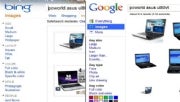Bing vs. Google: The Web Search Wars Heat Up
The search engine wars are back as Bing goes head-to-head with Google. With Microsoft's Bing jumping into second place in market share and assuming control of Yahoo's back-end search, the stage is set for a Google-Bing showdown.
In an attempt to throw aside preconceived notions, I've compared the most prominent search sections for Bing and Google, hoping that one of the engines would stand out as the winner. I invite you to do the same as you go through the list. (You'll find the full range of Bing's specialized search options on its Explore page. Google also has a page listing its services, both search and nonsearch.)
Basic Web Search
Here's the best way to think of Google vs. Bing in search: Google is laser-focused on its search results sending you to, hopefully, the most relevant Web pages, and it allows you to narrow results by date and location. It also indents results from the same Website for easy scanning. It's a powerful engine for delivering the best links, but it stays away from delivering its own information, such as explanations of people or things, directly in its search results.Search results from Bing and Google are often similar.Bing is the opposite. Search for a company by name, and Bing gives you the stock price and customer service number. Search for "attractions in Chicago, IL," and you get a list of things to see there. Hover over a link, and you get an option to view some relevant text from the page. Sometimes, Bing even links to related search results, such as "Diabetes Symptoms" when you only search for "Diabetes."
Strictly in terms of the traditional "10 blue links," Google and Bing are fairly similar. (To see this for yourself, do a blind search and try to tell which engine is which.) I sometimes get better results from Google -- particularly when trying to recall a specific page from a specific site -- but the bigger difference between the sites is how they sort and deliver information. My vote goes to the engine with a no-nonsense ability to serve up good links.
Winner: Google
Images
Winner: Google
Videos
As with images, Bing and Google offer similar customization options in video search, such as length, quality, and source, although Google has some extra options for closed captioning and recent uploads. Still, Bing excels overall here, with a grid of thumbnails that's a lot easier to navigate than Google's claustrophobic strip.Winner: Bing








0 comments:
Post a Comment